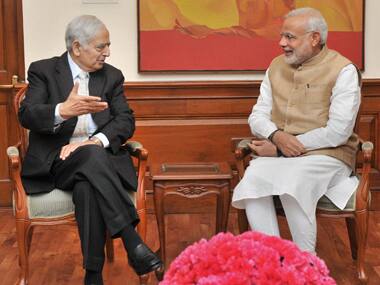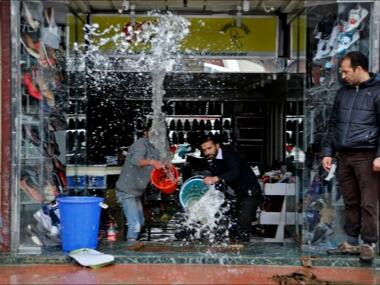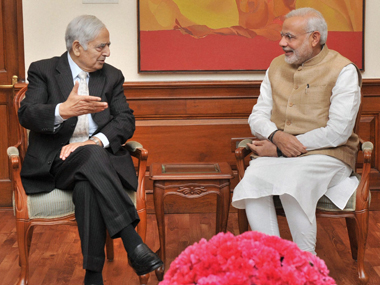The BJP-PDP alliance in J&K was received with a good deal of optimism in the state despite voices of dissent within the two parties which warned that ideological incompatibility would make the alliance unviable. But Muzaffar Hussain Baig, the most thoughtful leader of the PDP, represented a large chunk of Kashmiri opinion when he openly declared that “this alliance is in the interests of both J&K as well the two parties. If both PDP and BJP act in good faith, the alliance has the potential to bridge the vast emotional divide between the Jammu region and the Valley as well as between the Hindus and Muslims of the state.” He said this when neither BJP nor PDP was sure they could manage to forge a working partnership and, therefore, took nearly three months to arrive at a Common Minimum Programme. [caption id=“attachment_2348032” align=“alignleft” width=“380”]  File image of Sayeed with Modi. PTI image[/caption] There was good reason for people’s optimism regarding the potential of this alliance. In his first term as chief minister from 2002 to 2005, Mufti Mohammad Sayeed had provided substantial relief from the gross corruption and mismanagement of the earlier regime. Likewise, as CM of Gujarat, Narendra Modi came to acquire the reputation of Vikas Purush. Therefore, his promise of making J&K into a “Super State” came to be taken fairly seriously across the political spectrum, especially among aspirational youth. According to a report in The Times of India on 16 July, Prime Minister Modi is expected to announce a special financial package for Jammu & Kashmir - the total amount could be anywhere between Rs 70,000 crore and Rs 1 lakh crore. This is almost double the figure that the previous UPA regime had allotted for the state a little over a decade ago. This additional outlay is intended to support a range of developmental activities oriented towards producing more jobs, build a new IIT, IIM, etc, and upgrade the infrastructure in the state to make it more tourism-friendly. Unfortunately, this largesse has been needlessly delayed and, therefore, eroded some of the goodwill Modi had garnered in the state. Today, the PDP-BJP alliance is under severe strain due to lapses on both sides. During my recent visit to the state one saw palpable signs that the mood of optimism generated after the alliance assumed power in March 2015 had begun to turn into pessimism and negativity because the promised Vikas Yatra showed no signs of taking off. The people of J&K had expected Modi to take a great deal of personal interest in spelling out and implementing the development agenda for the state. But the last few months saw little action in that direction, giving a handle not just to opponents to trash the alliance but also to key PDP leaders, who said the alliance was a mistake and PDP should withdraw from it. It must be remembered that the BJP-PDP government took charge at a time when the state had still not recovered from the ravages caused by the unprecedented floods of September 2014. After the floods, the PDP had gone hammer and tongs at the Omar Abdullah government for its callous response to the crisis. By way of defence, Abdullah had passed the buck on to the Centre saying he had presented a demand of Rs 44,000 crore to the Centre for flood relief which they had failed to release. Therefore, the Centre was to blame. But, as usual, the state government did not present a coherent budget explaining where and how the money was to be spent. People didn’t fall for Omar’s blamegame and instead handed NC a resounding defeat in the December 2014 state election. The PDP made no secret of the fact that a key reason for their joining the coalition was the expectation that, with the BJP ruling at the Centre, J&K would get a hefty financial package, not just for rebuilding flood-damaged homes and public infrastructure, but also for the rapid overall development of the state. But they too went somewhat overboard in this regard. And yet, soon after government formation, PDP Finance Minister Haseeb Drabu pompously claimed that he was not the kind to go with a begging bowl to the Centre and that he was capable of raising enough internal resources to meet the requirements of the state. This was a sudden turn from the position he had taken a few days earlier that there could be no alliance unless the Centre agreed to pay the state Rs 290,000 crore on account of the loss of revenue resulting from the Indus Water Treaty signed by India with Pakistan. Such an astronomical figure can only be presented by someone practising voodoo economics, and yet PDP leaders advertised this figure, raising people’s expectations sky-high. The state also made extravagant demands for highly subsidised food supply to J&K — this, when going by its per capita income, J&K is not a poor state. Most important of all, Drabu did not include the Rs 290,000 crore in the budget presented to the Assembly, thereby indicating it was all bluster. The PDP-led government had come into power on 1 March 2015 — that is one day after the Union Budget was presented to parliament. For this reason the Union Budget could not obviously contain any package for J&K as no special demand could have reached the Finance Minister. When parliament is in its Budget session and the Finance Bill is under discussion, the Centre cannot sanction additional grants to any state without amending the Finance Bill under consideration of parliament. This year the Modi government has enhanced the share of states from 32 percent of the central pool of tax revenues under the UPA regime to 42 percent, thus living up to its promise of practising cooperative federalism. This gives states freedom to decide how and where to spend the money instead of sending tied grants, as was the practice during Congress-led governments. Mufti Sahib acknowledges that this is a major step forward in improving Centre-State relations. But instead of generating goodwill for the Centre, Drabu’s flip-flop has needlessly created doubts about the sincerity of the Modi government while dealing with the border state’s needs. [caption id=“attachment_2348038” align=“alignleft” width=“380”]  Floods in Kashmir earlier this year caused widespread damage. AP image[/caption] The protocol for additional grants is that the state has to make a detailed case in writing, substantiated and backed by solid socio-economic data as to why more resources are needed by it and how exactly these funds will be utilised. It has also to be included in the state’s budget presented to the assembly. While Drabu kept making verbal noises about demanding a special package, the state government failed to follow due process in this regard. The state budget session lasted about 65 days. During this period PDP could have made a request for additional grants backed by credible facts and figures and raised the issue in parliament. If Parliament was convinced by the state’s request for additional grants, the protocol requires the Finance minister to present an amendment to the Finance Bill. But none of this was done by PDP. After the conclusion of the Budget Session, the PM can sanction extra grants in case the concerned state makes a strong enough case with documentary evidence for the same. But this too was not done by Drabu. And yet he kept claiming that the Centre ought to give Rs 290,000 crore to the state. Clearly, no major grant materialised. When the state did get two instalments of Rs 3,300 crore and Rs 1,667 crore respectively, it fell far short of popular expectations. It didn’t help that Finance Minister Jaitley contributed to the annoyance by needlessly delaying the actual release of money after the grant had been approved and announced. What is worse, Drabu admits that he allowed Rs 10,000 crore of central funds to lapse because he failed to utilise the amount before 31 March. In his defence he says that while the state lost Rs 10,000 crore due to his carelessness, he caught false vouchers worth Rs 19,000 crore of the NC government. By stopping those payments, he has saved Rs 19,000 crore for the state. But knowledgeable sources within the PDP say that this is all bluster. The affected people are bound to take the government to court and embroil the state in an ugly legal battle. In any case, even if his claim of stopping payments on fake bills left behind by the previous government is taken at face value, which most people don’t, that does not justify letting Rs 10,000 crore lapse simply because he found no time to allocate or use those funds within the required period. This flip-flop has provided a convenient handle to separatists to declare that the PDP is a hapless puppet of the central government. Instead of pegging down people’s expectations to a more realistic level, some of the PDP leaders began declaring openly that their party should break off the alliance, thus undermining the credibility of their own government. The NC regimes of the past made J&K notorious for not presenting audited accounts or utilisation certificates for Central grants. The Centre always felt that it was pouring money in a black hole. During the previous PDP regime, the then finance minister Muzaffar Hussain Baig had done a good job of putting state finances in order, but Drabu is yet to get his act together. He has not rectified the NC’s mistake of not providing utilisation certificates for existing or previous grants before pitching for new additional grants. For reasons hard to understand, Chief Minister Mufti Mohammad Sayeed has chosen to sideline some of the experienced and administratively capable colleagues in favour of greenhorns for key portfolios. What is worse, some of the biggest scamsters of the National Conference regimes have been retained in key positions. The bureaucracy, in any case, seems more loyal to the previous regime as the National Conference allegedly had a more benign attitude to corrupt practices. By retaining and even rewarding the chief acolytes of the NC regime, the PDP has given a big jolt to all those, especially the youth, who had voted for it in the hope of clean governance. It doesn’t help matters that the BJP MLAs and ministers representing the Jammu region in this alliance are not only total novices as far as governance is concerned but also an internally divided lot. Having never before been anywhere close to power, they are still stuck with the mindset of a marginal opposition group. They hold several important ministries but are not able to handle their jobs with competence. The national BJP never bothered to cultivate strong leaders in Jammu region. Those handpicked as ministers do not have the required political stature so as to command acceptance, leave alone respect of their colleagues. Therefore, BJP MLAs are busy fighting with BJP ministers instead of presenting a united cohesive agenda for Jammu region. Most absurd of all, in typical Kejriwal style, they are organising public protests and dharnas/fasts over matters that can easily be sorted out within the government. For instance, several senior BJP leaders took a lead role in a Jammu bandh organised against the sanction of an AIIMS to the Kashmir region even though Jammu got an IIM and IIT. Such churlish conduct is strengthening the separatists, who can now claim that after the BJP came to power in J&K, the Muslims of Jammu region are facing virulent discrimination. The central leadership of the BJP needs to seriously consider giving crash courses to its ministers and MLAs so as to help them measure up to their new-found responsibilities and stop feeding the phobic fantasies of Kashmiri Muslims. Now that development package worth Rs 100,000 crore is about to be released by the Central government, both the Centre and the BJP MLAs in J&K will have to deftly handle the negative public discourse generated over the last few months due to the needless delays caused by Jaitley in reaching this money to the state. The inflated expectations built by PDP leaders in the meantime may make this hefty package appear too little, too late. According to recent news reports, the PMO has taken charge of reviving the investment cycle by swiftly resolving the hurdles delaying 410-and-odd big-ticket investments across sectors worth Rs 19.5 lakh crore, which have been stalled by the finance ministry. This had to be done because the finance ministry’s delay in funding key projects and recapitalising banks has dampened the economic mood in the country. Similar delays in reaching promised money to a troubled state like J&K has caused huge political damage. If the finance minister is such a busybody as to not have time to sign politically sensitive files and already agreed upon sanctions, then it’s time the PM to take direct charge of all those domains where dilly-dallying can make or mar the fortunes of NDA government. The PM has to pay close personal attention to the affairs of the state if he is serious about his promise of making J&K a “Super State”. This goal can’t be achieved by merely pouring additional money into the state. It requires deft political handling and creative use of India’s soft power. Neither BJP nor PDP can afford to let this historic mandate go waste. The author is the founder of Manushi
After delaying the promised development package for J&K, the centre is still far from regaining the lost momentum in this troubled border state. The early optimism generated by the formation of the PDP-BJP coalition last March is giving way to pessimism
Advertisement
End of Article


)

)
)
)
)
)
)
)
)



